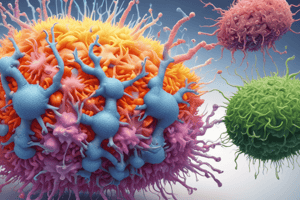Podcast
Questions and Answers
What is classification?
What is classification?
- The process of grouping things based on their similarities (correct)
- A naming system for organisms
- A group of closely related organisms
- The scientific study of how things are classified
What is taxonomy?
What is taxonomy?
The scientific study of how things are classified
What is binomial nomenclature?
What is binomial nomenclature?
The naming system used by Charles Linnaeus which gave organisms a two part scientific name
What is a genus?
What is a genus?
What is a prokaryote?
What is a prokaryote?
What is a eukaryote?
What is a eukaryote?
Why do biologists organize living things into groups?
Why do biologists organize living things into groups?
What do the levels of classification indicate about the relationships between organisms?
What do the levels of classification indicate about the relationships between organisms?
What characteristics are used to classify organisms into domains and kingdoms?
What characteristics are used to classify organisms into domains and kingdoms?
Study Notes
Classification and Taxonomy
- Classification is the process of grouping organisms based on similarities.
- Taxonomy is the scientific study dedicated to the classification of organisms.
Naming and Organism Groups
- Binomial nomenclature is a two-part naming system devised by Charles Linnaeus for organisms.
- Genus is a classification category that includes similar and closely related organisms.
Types of Organisms
- Prokaryotes are organisms whose cells lack a nucleus, such as bacteria.
- Eukaryotes are organisms that have cells containing a nucleus, including plants, animals, and fungi.
Purpose of Classification
- Biologists organize living things into groups to make studying organisms simpler and more systematic.
- Classification aids in understanding relationships between different organisms.
Relationships in Classification
- The number of classification levels shared between two organisms indicates their common characteristics.
- Organisms are classified into domains and kingdoms based on characteristics like cell type, nutritional needs, and cellularity.
Studying That Suits You
Use AI to generate personalized quizzes and flashcards to suit your learning preferences.
Description
Test your knowledge on the principles of classification and taxonomy in biology. This quiz covers key terms like binomial nomenclature and the differences between prokaryotes and eukaryotes. Understand the importance of grouping organisms and their relationships in an ecological context.




